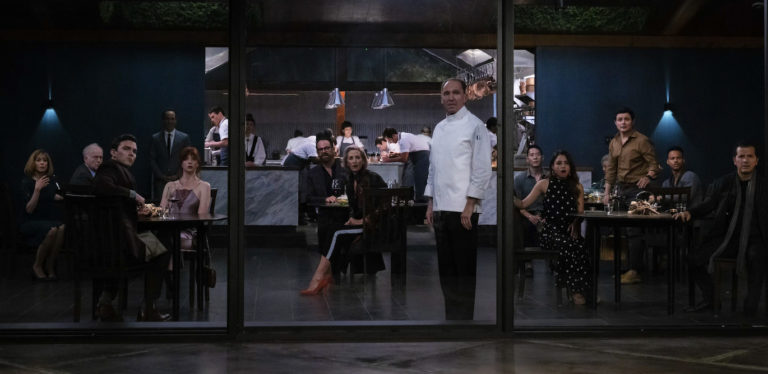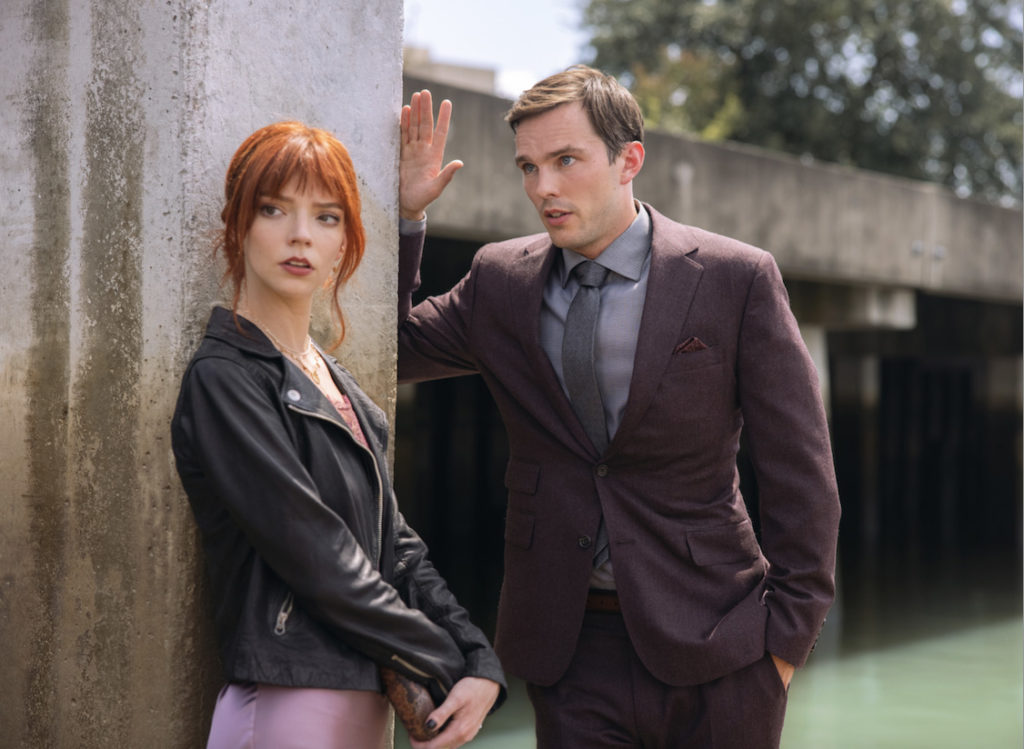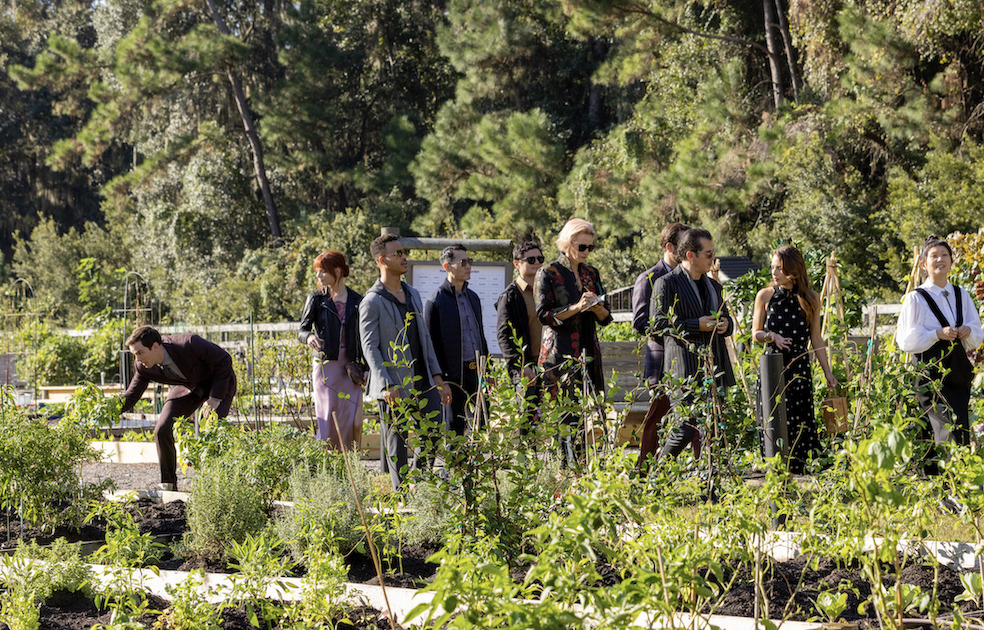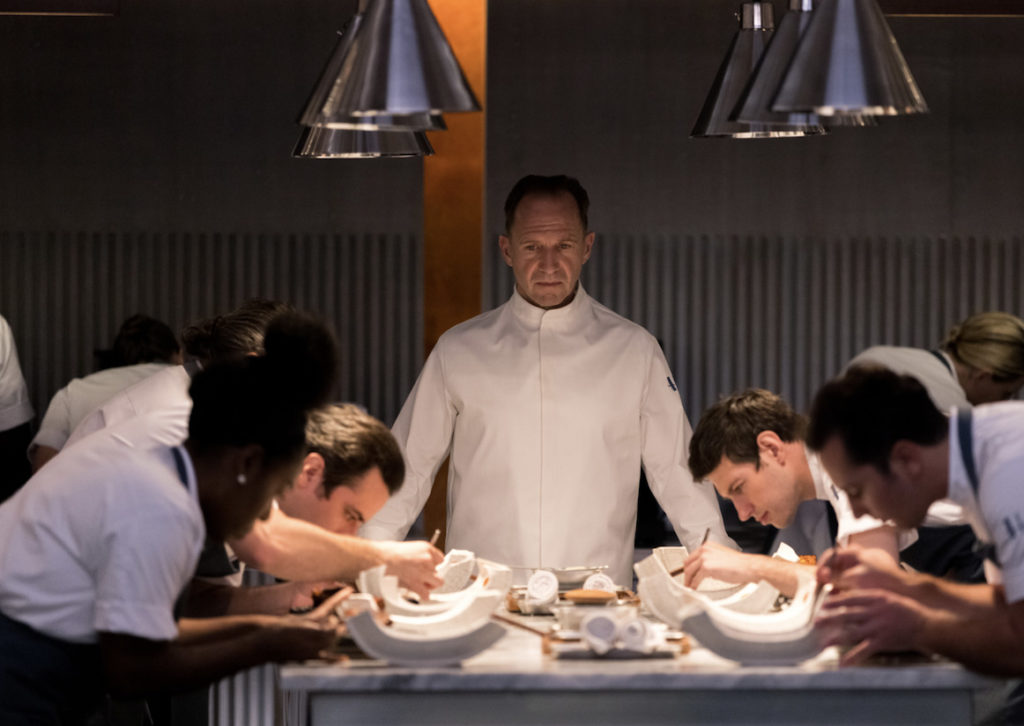
Press Conference with Actors Anya Taylor-Joy, Nicholas Hoult, John Leguizamo, Aimee Carrero, Hong Chau, Judith Light, and Director Mark Mylod
Q: Before we get into the nitty gritty of stuff, I want to ask a question of everybody we’ve got here. One of the really wonderful things about The Menu is you have this incredible mix of tones. It’s a broad social satire, it’s a Grand Guignol horror film, it’s a very dry comedy, it’s a high tragedy. From the perspective of both the director and the cast, how did you all manage to find the right balance that serves all these different thematic courses?
MARK MYLOD: I’m going to jump in first and play director’s privilege. For me first of all, instinctive in reading the script, I think one of the things that drew us all to the project was that lovely mashup of tones that I think as Anya said, it’s quite a small target to hit. But we were all attracted to how specific that was. And then I think for me it was the few days or the week that we spent doing our version of rehearsals, which was basically to sit together or in smaller groups in a room and just talk about issues that interested us in the script and in our story and about our characters. And in doing so, it was perhaps less about what we were actually saying and more about us all tuning in by osmosis, perhaps unconsciously to get on the same level. I think it’s a Sydney Pollack quote about everybody making the same movie, so that by the time we were on set, we all tuned in together and we continued to do so with the huge benefit of shooting the film almost entirely chronologically.
Q: I’m sorry, did you say you shot the film almost entirely chronologically? How did that affect the performances from everybody? I’m want to hear from Anya and Nicholas first.
ANYA TAYLOR-JOY: I think it helped us immensely because there’s a very specific turning point in the film where things do start to get dramatically darker. And up until that point we’d all been having quite a nice, if odd dinner party. And then the way that this scene was shot was so visceral, I think it kind of shocked all of us when it happened. That led us down the new tone of the film. Less of the laughs, more of the gasps really. So I think it really helped us carry that through.
MARK MYLOD: There was also this element, wasn’t there, that we talked about in rehearsal? I think I gave you a homework assignment, which is quite patronizing. Sorry about that. Which was for everybody to go and watch the “Exterminating Angel” because there was something in Bunuel’s film that I loved, and that was this dawning sense of culpability of the guests. That was something that we were all really interested in. How could we get our guests to walk into that space so full of entitlement and their flushed egos, and go from that and through the whispers of Chef Slowik, to gradually have these layers peeled back; their vanity gradually stripped back so that by the end of the film they’re figuratively emotionally naked and willing to pay the check for their own demise, somewhat.
JUDITH LIGHT: Yeah, and I just wanted to add also that when you have a script that is so fragile and so skeletally created on the surface, but there’s all this other stuff that’s going on underneath and there’s all this room for creativity and expansion and that was really how we came to work on it together. To create all of those things that you were just talking about, Mark. Also a camaraderie was formed. We really were with each other all the time, every day. And there was this intimacy that was also created that allowed for all those different tones to take place.
HONG CHAU: Yeah, it’s a really tricky script. I signed on not really being able to picture what the final product would look like. That was exciting to me, because I was curious to see how it would turn out and I knew that the people involved were great collaborators to take that leap of faith with. I was a huge fan of Succession and I knew that Mark would be able to take these characters who are unlikable for so many reasons, and somehow weave together a story where you cared about what happened, not necessarily to them, but cared about the situation. It was just surprising that I felt even some sort of heartbreak for some of the characters, and that’s just a special gift that MARK MYLOD has.
JUDITH LIGHT:There was that, and I loved what you just said about the curiosity. “It peaked your curiosity.” And I think that’s what it’s going to do for audiences too. They’re going to be pulled long on this. There’s an enticement within the structure of this film and this filmmaking. Mark has the best sense of humor in the world, so that made the lightness of all of that. This could have been a really dour experience, and we all connected.
ANYA TAYLOR-JOY: Not inaccurate.
JUDITH LIGHT: His humor is so delicious, as well as his talent. So all of that really made a lot of difference.
MARK MYLOD: I loved how willing you all were to jump on board this idea of this Altman-esque way that we worked where we were all marked up the whole time. We were all on set together pretty much every day, and never quite knowing entirely where the camera was going to be some of the times. Particularly in those group scenes. And the way that you all improvised and just keeping those secondary and tertiary layers of the conversation going through the group shots and beyond our scripted dialogue. The insights that gave us all into extra dimensions of the character, and Amy and John could probably get the gold medal at their table for some of the work you came up with.
In fact, one of the biggest laughs that we’ve had in early screenings with that lovely improv. I don’t want to spoil it for the audience, but something to do with you handling in your notice Amy, and a bad reference maybe that John’s character gave you, which is still gets huge laughs in every screening. As well as those laughs, just the insight that gave us to explore these various entitled characters, but to find their underbelly, to find out how and why they got there and where their vulnerabilities are, specifically.
NICHOLAS HOULT: I think my favorite line that was improvised-I think it was improvised. Amy, did you improvise the emoji line? Because that had me cracking up when I saw that.
AIMEE CARRERO: Yeah, we had a few. The emoji line and then John had something which you can barely hear in the final edit, but man, it gets me every time. You said something about, “Oh yeah, I love a frozen ice treat.” And he’s talking about ice cream, but he calls it ‘frozen ice treat’ or something, which to me is just-I think I even heard it when we were doing ADR. I don’t even know if it’s in the final whatever, but it’s just a crazy thing you say that you hear in passing.
JOHN LEGUIZAMO: I was trying to channel privilege ’cause I don’t understand that.
AIMEE CARRERO: Frozen ice treat.
JOHN LEGUIZAMO: Yeah, I love the political and social commentary of this film because I feel like it’s tapping into something that’s happening, especially in America, maybe across the world as well. The disappearing middle class, and these billionaires who think they can control our democracies, control our social platforms, control us, and how they separate us and keep us out and go into their little special bubbles. I think it’s a great commentary on the privilege that’s happening in America, and entitlement and people creating an ‘us vs. them’ and I love them getting their punishment in this flick.

Q : I’ve got a question for Anya, because all we initially know about your character is that she couldn’t care less about this fancy-pants food and that she’s not supposed to be there. And then we sort of understand that the chef’s taken a particular interest in her and that leads to a lot of wonderful exchanges between you and Ralph Fiennes. Can you talk about working with him on those scenes, the dynamic between the two of you, how to play that contempt? Is the word that you would use for how he feels about those guests?
ANYA TAYLOR-JOY: Oh, what can I say about Ralph? He’s the most phenomenal actor, but the thing that’s interesting is he’s so talented that whatever he wants to transmute on screen, that will happen. So of course, as an audience member you will feel this formidable presence and this fear, whenever he’s there. Maybe it was our characters, maybe it’s the way that we both approach acting. All of our scenes together felt so warm and intimate even when we were being quite rude to each other, when the stakes were pretty high. I always just felt really comfortable with him and I felt like I had a very generous dance partner and that we were both enjoying that bizarre intimacy. We had a great time together.
Q : Nicholas, there’s a journalist here that wants to know if you did a deep dive into the world of food influencers and food obsessives to prepare for this. You do a lot of research in a Pacojets?
ANYA TAYLOR-JOY: Nick had a really, really hard time preparing for this movie. Nick, tell them about your preparation.
NICHOLAS HOULT: I did. It was very difficult because I had to eat at nice restaurant and watch lots of food shows. It was one of those amazing things that the more of Chef’s Table I watched, the more that I was in awe and amazed by these singular-minded, dedicated chefs who committed their whole lives to their craft. And then I was starstruck because Dominique Crenn, who was the food advisor on the movie and designed the menu, she was on set one day and I’d seen her episode and I was like, “Oh my God, it’s her.” And I was asking her how you pronounce French words and if I got it right, I’d be like, “Oh, she said I said it right.” So I just basically became an annoying-
ANYA TAYLOR-JOY: She was the rockstar of the set, yeah. For sure.
NICHOLAS HOULT: -little person, like my character that was just obsessed with that world. So that makes it very easy to be in those scenarios with Ralph and Chef Slowik. Because I’m like, “I am in awe of him and as an actor anyway, so I can just use that as the character.”
Q : I think whether you’ve worked in the hospitality service or you’ve just eaten at a lot of fancy restaurants, you have inevitably come across a host or a general manager who is a major domo who has this incredibly intimidating, menacing sense of presence, and you do not want to cross him or her. I have never seen that so accurately portrayed as we get with Elsa here. HONG CHAU, can you please talk a little bit about finding that right sense of rigid authority to bring to her? And what you were thinking when you whispered to that finance bro, “You’ll eat less than you desire, and more than you deserve.”
HONG CHAU: To bring it back to Dominique Crenn quick, she was on set serving as our consultant and making sure that everything was accurate and that we were running the set in a way that was true to a restaurant of that caliber. I was a little bit sheepish about talking to her, but one day she sidled up next to me and she was like, “I love what you’re doing. I think spot on and I want you to come and work for me.”
And that was such a huge compliment and seal of approval, one that probably meant more than any compliment Mark had given. I was like, “Oh my gosh. Wow.” I would say that there wasn’t a lot of information about Elsa on the page, and so that was something that Mark and I talked about a lot prior to filming. I was hoping to find moments where we could create some sort of intrigue and draw some curiosity and interest from the audience about who Elsa was outside of the restaurant or how she came to be a part of Chef Slowik’s crew. I was filming something in Portland, Oregon at the time and the restaurant was supposed to be said in the Pacific Northwest, so I was really inspired by a lot of the funky people that I witnessed around me. I came up with a backstory from that, and I asked Mark if we could have a really strong visual look for her. And he initially told me no, and I was really stubborn and I dug my heels in.
MARK MYLOD: You enlisted the costume designer and ganged up on me.
HONG CHAU: Thankfully, Amy Westcott our costume designer, who also happens to be Mark’s wife in real life, was very happy to conspire with me against Mark’s wishes. She came up with that really beautiful costume for Elsa. It’s black and white and really visually striking, and that just helped me so much in creating the character.

Q : I’ve got a joint question for John and Amy here. John, you get to play one of the juiciest roles that any actor can play, which is a movie star who is behaving badly. Were there any folks in particular that you drew from or borrowed from?
ANYA TAYLOR-JOY: Oh no. Here we go.
AIMEE CARRERO: He’s named names already, baby.
Q : While you’re thinking of names to name. Amy, I’m just wondering, we find out really interestingly that this assistant comes slightly from privilege, but she’s still in a subservient role. I’m just wondering how you found the balance to play those two tones, the same thing. John, you go first.
JOHN LEGUIZAMO: I’m not being typecast here, so because I’m not washed up and I’m not an action star, so I’m not a washed up action star. But I’ve worked with a lot of action stars who became washed up and I modeled it after one person in particular who was a bit of an a-hole and a bully. Okay, Steven Seagal. I modeled after Steven Seagal because I did a movie with him and in rehearsals he knocked me out and he didn’t care.
AIMEE CARRERO: Did he knock you out or punched you?
JOHN LEGUIZAMO: Knocked me out.
AIMEE CARRERO: Whoa. Rude.
JOHN LEGUIZAMO: Hit me with an elbow in my solar plexus and knocked me against the wall, because I was laughing at him. I forgot to mention that part. I was a bit of a dick then. Sorry, I had to give that fact. So that’s who I was modeling after. I’d seen these privileged guys, and these guys who come into a room with so much narcissism and self-it’s like they suck the oxygen out of the room because they want all the attention and everything’s got to be on them, otherwise they turn negative. So that’s what I was trying to create, because it doesn’t naturally come to me.
AIMEE CARRERO: It doesn’t. You’re very kind.
JOHN LEGUIZAMO: Oh, you kind of said that with that look. I see what you’re trying to do.
AIMEE CARRERO: As far as the power dynamic, one of the things I love so much about the script is that nothing is ever as it seems. When you think something’s going to happen, the other thing happens. I think this is true of some of the other tables too, where the power dynamic should be one thing, but really it’s another. Felicity is an assistant to a movie star, but her mother runs a major studio. So her mother has procured her this job and she’s play acting this career with the movie star, and it’s kind of clear who runs things kind of. So I feel like the movie star sort of needs Felicity a little more than Felicity needs a movie star.
Of course, it is codependent in a lot of ways, but I think that’s what makes this movie so special. When you think it’s going to go one way, it goes another way. There’s the food critic played by Janet McTeer, and her editor Paul Adelstein. And it’s clear that the editor should have all the power, but really it’s a food critic. He finishes her sentences, at the end of the sen-
JOHN LEGUIZAMO: -sentences.
AIMEE CARRERO: -sentences like that. So I loved that. I loved exploring that about her, and she’s also complicit in all of this too. As Seth Reiss, one of our writers likes to say, she was born on third base. And that’s something that she has a huge advantage over other people.

Q : It’s interesting you brought up the changing power dynamics too, because you can definitely see that with the old, married couple played by JUDITH LIGHT and Reed Birney. First off, two theater legends on the same table. Amazing. Yes, definitely clap. And second, I love how her arc changes; how she really comes in like the lamb and leaves like the lion. Judith, do you want to talk a little bit about that?
JUDITH LIGHT: Yeah, I feel very much the same way that you do. And I adore Reed and we’ve been friends for a long, long time. When you watch a woman who has lived her life giving up her soul and herself in order to have the privilege that she so desperately wants, and begins to realize through the course of the film-just like Amy just said-is that you think it’s one way and it’s not that way. It turns into something else and you begin to see that she wakes up as she realizes that her life is not what she wanted it to be. She’s not who she wants to be and she’s not living the way that she wants to live. And so there is this bubbling, this cauldron that’s underneath all the time within the dynamic. And where that begins to shift and play out is in relation to Anya’s character.
You begin to see that there’s a uniting of these two women in a very simple-I think maybe we say three words to each other in the entire film-but you can see the process of what’s happening within the heart and soul of this person. You don’t really see it until things begin to unfold in the most powerful, painful kinds of ways. So between the two of us, between Reed and myself, I felt a very special and deep kind of rehearsal. Mark was saying in the beginning we all had these rehearsals with each other, and we improvised something between the two of us that was so moving and poignant and powerful because you know you walk into a restaurant and you see those two people. They’re not talking to each other, they never talk to each other. And you say to your partner, “I’m never going to be that person. I’m never going to be the person in that relationship.” And there you are, and one day you wake up and there you are and you are that person.
And so we were discovering all those things all of the time. So Mark really gave us the depth and the breadth within the creativity of those rehearsals, and being on the set as well, our reactions to other people that really illuminated, and you begin to see this character; you see her transformation over time.
Q : Listen, I could talk to you guys about this movie for hours, but I’m being told that I have to drop the check on the table. Thank you all so much for being here and answering these questions. Thank you to everybody who submitted questions. The movie is out on Friday, November 18th.
JOHN LEGUIZAMO: Friday.
AIMEE CARRERO: Thank you very much.
Q : Okay, take care.
JOHN LEGUIZAMO: Thank you.

